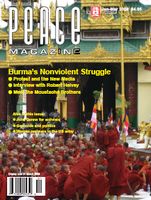
Peace Magazine Jan-Mar 2008, page 23. Some rights reserved.
Search for other articles by Ron Shirtliff here
How We Hate It, Love It, and Accept It
Global Public Opinion on Nuclear Weapons is a revealing survey conducted in six Western nations for The Simons Foundation at Simon Fraser University.
One thousand people in each of six Western nations were asked 15 questions in July and August 2007 about their attitudes to nuclear weapons. Four of the nations have the bomb, the USA, Britain, France and Israel, (which everyone knows has the weapon but which refuses to confirm or deny it). Two nations, Italy and Germany, have no nuclear arms of their own, but as members of NATO, probably have nuclear weapons on their territory, although not under their sole command.
Dr Jennifer Simons, responsible for the report, notes: "The Cold War may be over, but the threat of a nuclear war has escalated. We are facing an extremely volatile situation on four fronts: the US and Russia are upgrading the capability of their arsenals; there is a new generation of nuclear countries such as India and Pakistan who have tested their weapons; there are states that aspire to become nuclear powers; and there are terrorist groups that want to acquire nuclear weapons. We are entering a nuclear renaissance and citizens are very concerned."
Analyzing the survey results, Ernie Regehr notes in Ploughshares Monitor the public ambivalence to nuclear weapons. Some 79 per cent of Americans think that nuclear weapons make the world a more dangerous place. Only 10 per cent think the world is safer because of nuclear weapons. But when the same Americans were asked how they felt about their own country's nuclear weapons, 47 per cent said the weapons made them feel safer, only 32 per cent felt less safe. Israelis top the list here with 73 per cent feeling safer with nuclear weapons while 27 per cent think those weapons make the world a more dangerous place.
Generally, this ambivalence is true of other citizens of the Western nuclear club. In contrast, "non-nuclear" NATO members, Italy and Germany, feel safer because they do not have nukes.
Regehr sums it up well: In countries without nuclear weapons, people find all nuclear weapons threatening; in countries with nuclear weapons, people find all nuclear weapons threatening except their own.
This public confusion leaves the leaders of the nuclear states and their allies free to pursue whatever course they choose.
Support for the Comprehensive Nuclear Test-Ban, which bans all nuclear explosions, gains 80 per cent support in the European nations (they have ratified the Treaty) but falls dramatically in the US, 56 per cent, and Israel, 45 percent. The later two nations have not ratified the Treaty, and the Americans administration now talks about the need to develop new nukes.
While the majority in all nations agree that there should be no further spread of nuclear weapons, the Non-Proliferation Treaty itself gets thumbs down across the board for its perceived failure. Many, but not a clear majority, feel the nuclear sharing arrangements within NATO are a violation of the Treaty. At the same time there is a strong consensus among all citizens supporting the elimination of all nuclear weapons in the world through an enforceable agreement. The desire for abolition is there even if there is no evident way to achieve it. There is the same general consensus in favor of banning all weapons in space and a hearty concern that nukes be kept out of the hands of potential terrorists.
A slight majority of citizens of non-nuclear states assert the immorality of nuclear weapons, but nuclear states are more ambivalent, notably the US where only 27 per cent think nukes immoral and Israel, 16 per cent.
Israelis stand out. This survey suggests a rather aggressive public as relates to nuclear weapons: on immorality, the lowest at 16 per cent; on developing new weapon, the highest at 11 per cent; on using them in a war, the highest at 35 per cent.
This is a valuable and thought provoking survey but it is limited to a rather small portion of the world. It would be wonderful if the Simons Foundation could find the funds to make a broader study. What do the citizens of the rest of the world think, other nuclear weapons states, China, Russia, India, Pakistan, and, major non-nuclear states such as Japan, New Zealand, Brazil, Sweden and Canada? Would there be a greater or lesser disconnect between their citizens' opinions and their national policies?
Although overall the respondents favored nuclear disarmament, this survey gives little optimism that the sixty-year era of nuclear madness is nearly over. The recent Bush initiative that supports the Indian nuclear program suggests that it is business as usual with the great powers; nukes are just another card in the traditional game of power politics, whatever citizens might think about the wisdom or morality of the game plan.
The survey presents the responses by citizens in a useful visual format and it also includes a wealth of interesting information by differentiating responses by gender and age in each country. The full document is available at: (www.angusreidstrategies.com/global).
Ron Shirtliff is one of Peace's editors and a member of Science for Peace.

Peace Magazine Jan-Mar 2008, page 23. Some rights reserved.
Search for other articles by Ron Shirtliff here